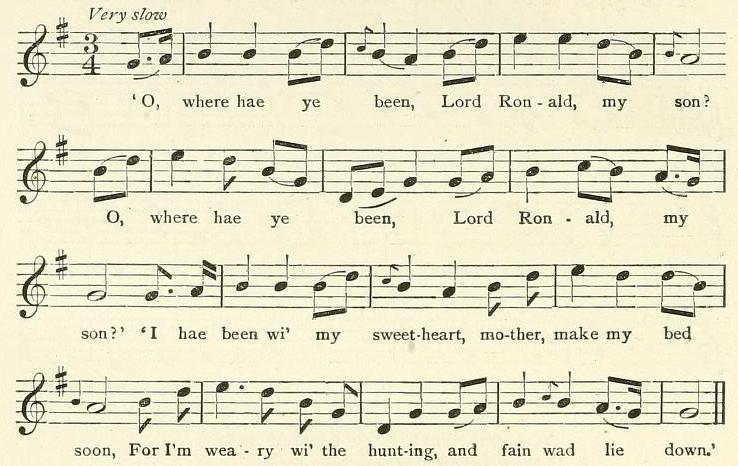Lord Ronald, My Son- Robert Burns 1792 Child F
The music and notes are from The songs of Robert Burns, Page 491 by james Dick; Robert Burns, James C. F.'Lord Ronald, my Son,' Johnson's Museum, No 327, p. 337. Version F
LORD RONALD, MY SON- Child 12; Lord Randal Version F
Johnson's Museum, No 327, p. 337. Communicated by Burns. Collected by Robert Burns, as sung in Ayrshire.

1 'O where hae ye been, Lord Ronald, my son?
O where hae ye been, Lord Ronald, my son?'
'I hae been wi my sweetheart; mother, make my bed soon,
For I'm weary wi the hunting, and fain wad lie down.'
2 'What got ye frae your sweetheart, Lord Ronald, my son?
What got ye frae your sweetheart, Lord Ronald, my son?'
'I hae got deadly poison; mother, make my bed soon,
For life is a burden that soon I'll lay down.'
* * * * *
______________
From: The Songs of Robert Burns by James C. Dick - 1903
No. 341. O, whore hae ye been Lord Ronald, my son?
In the Scots Musical Museum, 1793, No. 327, from Bums's MS. in the British Museum, entitled Lord Ronald, my son. The fragment of this ancient ballad, with the beautiful air to which it is sung, were both recovered by Bums and placed in the Museum': (Stenhouse, Illust. 311). Later versions appear in Scott's Minstrelsy, 1803, iii. 292; Kinloch's Scottish Ballads, 1837, no, entitled Lord Donald, where the young man's sweetheart poisons him, with 'a dish of sma' fishes.' The legacy he leaves with his mother is described in the last two lines :—
'The tow and the halter for to hang on yon tree, And lat her hang there for the poysoning o' me.' A selection of versions entitled Lord Randal is in Child's Ballads, 1883, i. 131. The legend is dispersed over the continent of Europe, and Child states that it is current in German, Dutch, Magyar, Sclavonic, Italian and other languages.
Bums refers to the tune as follows: 'This air, a very favourite one in Ayrshire, is evidently the original of Lochaber:' (Interleaved Museum). The air Lord Ronald is derived from Lochaber, which in its turn comes from King James March in Ireland, appearing for the first time in Ley den's MS. 1693, and again in Atkinson's MS. 1694. The tune obtained the title Lochaber for the first time from Ramsay's well-known song in the Tea-Table Miscellany, 1724, and the music is in Craig's Scots Tunes, 1730, 26; the Orpheus Caledonius, 1733, No. 20; and later collections. The three melodies differ in detail from one another, and the assumption that the King James March is de facto the original is founded on its prior appearance; but the Lord Ronald air in the text which Bums communicated to Johnson's Museum, having only one movement, and the others being double tunes, goes to confirm the theory of Burns that the simpler air, although last printed, may be the earliest of the three.